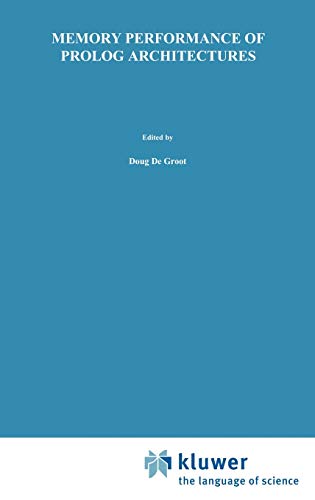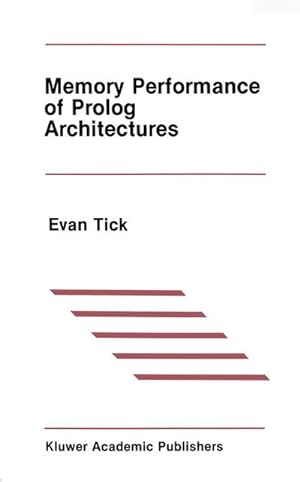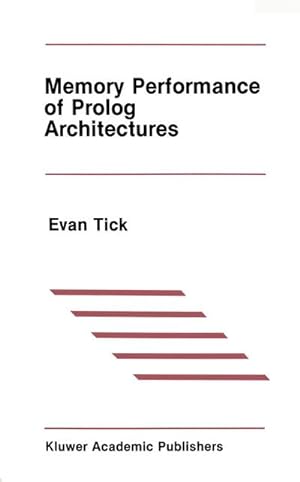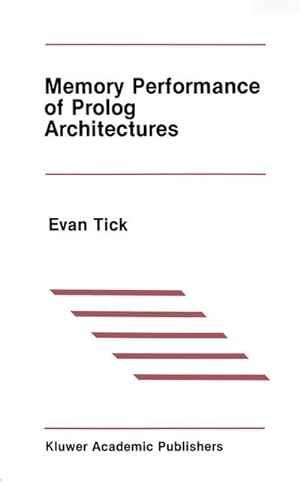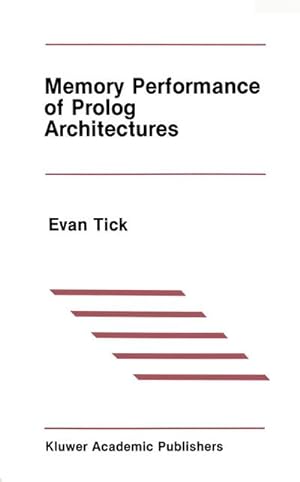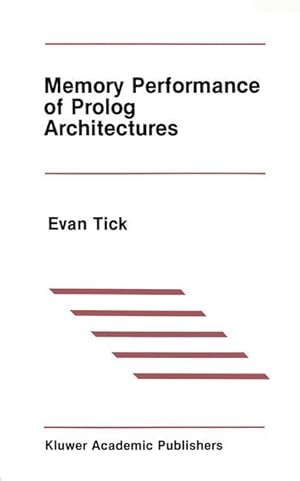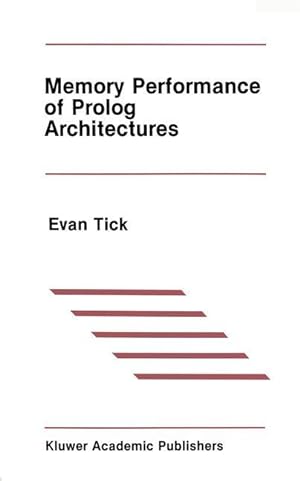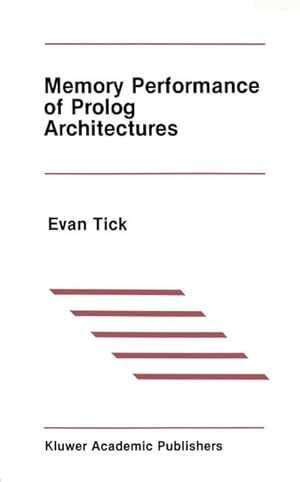memory performance prolog architectures de tick evan (21 resultados)
Filtros de búsqueda
Tipo de artículo
- Todos los tipos de productos
- Libros (21)
- Revistas y publicaciones (No hay ningún otro resultado que coincida con este filtro.)
- Cómics (No hay ningún otro resultado que coincida con este filtro.)
- Partituras (No hay ningún otro resultado que coincida con este filtro.)
- Arte, grabados y pósters (No hay ningún otro resultado que coincida con este filtro.)
- Fotografías (No hay ningún otro resultado que coincida con este filtro.)
- Mapas (No hay ningún otro resultado que coincida con este filtro.)
- Manuscritos y coleccionismo de papel (No hay ningún otro resultado que coincida con este filtro.)
Condición Más información
- Nuevo (18)
- Como nuevo, Excelente o Muy bueno (1)
- Bueno o Aceptable (2)
- Regular o Pobre (No hay ningún otro resultado que coincida con este filtro.)
- Tal como se indica (No hay ningún otro resultado que coincida con este filtro.)
Encuadernación
Más atributos
- Primera edición (No hay ningún otro resultado que coincida con este filtro.)
- Firmado (No hay ningún otro resultado que coincida con este filtro.)
- Sobrecubierta (No hay ningún otro resultado que coincida con este filtro.)
- Con imágenes (9)
- No impresión bajo demanda (13)
Idioma (1)
Gastos de envío gratis
- Envío gratis a Estados Unidos de America (No hay ningún otro resultado que coincida con este filtro.)
Ubicación del vendedor
Valoración de los vendedores
-
Memory Performance of Prolog Architectures: 40 (The Springer International Series in Engineering and Computer Science, 40)
Librería: AwesomeBooks, Wallingford, Reino Unido
EUR 10,21
Envío por EUR 5,74
Se envía de Reino Unido a Estados Unidos de AmericaCantidad disponible: 1 disponibles
Añadir al carritohardcover. Condición: Very Good. Memory Performance of Prolog Architectures: 40 (The Springer International Series in Engineering and Computer Science, 40) This book is in very good condition and will be shipped within 24 hours of ordering. The cover may have some limited signs of wear but the pages are clean, intact and the spine remains undamaged. This book has clearly been well maintained and looked after thus far. Money back guarantee if you are not satisfied. See all our books here, order more than 1 book and get discounted shipping. .
-
Memory Performance of Prolog Architectures: 40 (The Springer International Series in Engineering and Computer Science, 40)
Librería: Bahamut Media, Reading, Reino Unido
EUR 10,21
Envío por EUR 8,02
Se envía de Reino Unido a Estados Unidos de AmericaCantidad disponible: 1 disponibles
Añadir al carritohardcover. Condición: Very Good. Shipped within 24 hours from our UK warehouse. Clean, undamaged book with no damage to pages and minimal wear to the cover. Spine still tight, in very good condition. Remember if you are not happy, you are covered by our 100% money back guarantee.
-
Memory Performance of Prolog Architectures (The Springer International Series in Engineering and Computer Science)
Librería: Lucky's Textbooks, Dallas, TX, Estados Unidos de America
EUR 154,88
Envío por EUR 3,36
Se envía dentro de Estados Unidos de AmericaCantidad disponible: Más de 20 disponibles
Añadir al carritoCondición: New.
-
Memory Performance of Prolog Architectures (The Springer International Series in Engineering and Computer Science, 40)
Librería: Lucky's Textbooks, Dallas, TX, Estados Unidos de America
EUR 154,88
Envío por EUR 3,36
Se envía dentro de Estados Unidos de AmericaCantidad disponible: Más de 20 disponibles
Añadir al carritoCondición: New.
-
Memory Performance of Prolog Architectures (The Springer International Series in Engineering and Computer Science, 40)
Librería: Ria Christie Collections, Uxbridge, Reino Unido
EUR 159,02
Envío por EUR 13,77
Se envía de Reino Unido a Estados Unidos de AmericaCantidad disponible: Más de 20 disponibles
Añadir al carritoCondición: New. In.
-
Memory Performance of Prolog Architectures (The Springer International Series in Engineering and Computer Science)
Librería: Ria Christie Collections, Uxbridge, Reino Unido
EUR 159,37
Envío por EUR 13,77
Se envía de Reino Unido a Estados Unidos de AmericaCantidad disponible: Más de 20 disponibles
Añadir al carritoCondición: New. In.
-
Memory Performance of Prolog Architectures
Librería: Books Puddle, New York, NY, Estados Unidos de America
EUR 200,74
Envío por EUR 3,36
Se envía dentro de Estados Unidos de AmericaCantidad disponible: 4 disponibles
Añadir al carritoCondición: New. pp. 256.
-
Memory Performance of PROLOG Architectures
Idioma: Inglés
Publicado por Kluwer Academic Publishers, 1987
ISBN 10: 0898382548 ISBN 13: 9780898382549
Librería: Kennys Bookshop and Art Galleries Ltd., Galway, GY, Irlanda
EUR 198,37
Envío por EUR 10,50
Se envía de Irlanda a Estados Unidos de AmericaCantidad disponible: 15 disponibles
Añadir al carritoCondición: New. Series: The Springer International Series in Engineering and Computer Science. Num Pages: 232 pages, biography. BIC Classification: UYF. Category: (P) Professional & Vocational; (UP) Postgraduate, Research & Scholarly. Dimension: 231 x 158 x 19. Weight in Grams: 480. . 1987. Hardback. . . . .
-
Memory Performance of Prolog Architectures
Idioma: Inglés
Publicado por Springer US, Springer US Dez 1987, 1987
ISBN 10: 0898382548 ISBN 13: 9780898382549
Librería: buchversandmimpf2000, Emtmannsberg, BAYE, Alemania
EUR 160,49
Envío por EUR 60,00
Se envía de Alemania a Estados Unidos de AmericaCantidad disponible: 2 disponibles
Añadir al carritoBuch. Condición: Neu. Neuware -One suspects that the people who use computers for their livelihood are growing more 'sophisticated' as the field of computer science evolves. This view might be defended by the expanding use of languages such as C and Lisp in contrast to the languages such as FORTRAN and COBOL. This hypothesis is false however - computer languages are not like natural languages where successive generations stick with the language of their ancestors. Computer programmers do not grow more sophisticated - programmers simply take the time to muddle through the increasingly complex language semantics in an attempt to write useful programs. Of course, these programmers are 'sophisticated' in the same sense as are hackers of MockLisp, PostScript, and Tex - highly specialized and tedious languages. It is quite frustrating how this myth of sophistication is propagated by some industries, universities, and government agencies. When I was an undergraduate at MIT, I distinctly remember the convoluted questions on exams concerning dynamic scoping in Lisp - the emphasis was placed solely on a 'hacker's' view of computation, i. e. , the control and manipulation of storage cells. No consideration was given to the logical structure of programs. Within the past five years, Ada and Common Lisp have become programming language standards, despite their complexity (note that dynamic scoping was dropped even from Common Lisp). Of course, most industries' selection of programming languages are primarily driven by the requirement for compatibility (with previous software) and performance.Springer Verlag GmbH, Tiergartenstr. 17, 69121 Heidelberg 258 pp. Englisch.
-
Memory Performance of Prolog Architectures
Idioma: Inglés
Publicado por Springer US, Springer New York, 2011
ISBN 10: 1461292026 ISBN 13: 9781461292029
Librería: AHA-BUCH GmbH, Einbeck, Alemania
EUR 167,14
Envío por EUR 61,97
Se envía de Alemania a Estados Unidos de AmericaCantidad disponible: 1 disponibles
Añadir al carritoTaschenbuch. Condición: Neu. Druck auf Anfrage Neuware - Printed after ordering - One suspects that the people who use computers for their livelihood are growing more 'sophisticated' as the field of computer science evolves. This view might be defended by the expanding use of languages such as C and Lisp in contrast to the languages such as FORTRAN and COBOL. This hypothesis is false however - computer languages are not like natural languages where successive generations stick with the language of their ancestors. Computer programmers do not grow more sophisticated - programmers simply take the time to muddle through the increasingly complex language semantics in an attempt to write useful programs. Of course, these programmers are 'sophisticated' in the same sense as are hackers of MockLisp, PostScript, and Tex - highly specialized and tedious languages. It is quite frustrating how this myth of sophistication is propagated by some industries, universities, and government agencies. When I was an undergraduate at MIT, I distinctly remember the convoluted questions on exams concerning dynamic scoping in Lisp - the emphasis was placed solely on a 'hacker's' view of computation, i. e. , the control and manipulation of storage cells. No consideration was given to the logical structure of programs. Within the past five years, Ada and Common Lisp have become programming language standards, despite their complexity (note that dynamic scoping was dropped even from Common Lisp). Of course, most industries' selection of programming languages are primarily driven by the requirement for compatibility (with previous software) and performance.
-
Memory Performance of Prolog Architectures
Idioma: Inglés
Publicado por Springer US, Springer US, 1987
ISBN 10: 0898382548 ISBN 13: 9780898382549
Librería: AHA-BUCH GmbH, Einbeck, Alemania
EUR 168,73
Envío por EUR 62,78
Se envía de Alemania a Estados Unidos de AmericaCantidad disponible: 1 disponibles
Añadir al carritoBuch. Condición: Neu. Druck auf Anfrage Neuware - Printed after ordering - One suspects that the people who use computers for their livelihood are growing more 'sophisticated' as the field of computer science evolves. This view might be defended by the expanding use of languages such as C and Lisp in contrast to the languages such as FORTRAN and COBOL. This hypothesis is false however - computer languages are not like natural languages where successive generations stick with the language of their ancestors. Computer programmers do not grow more sophisticated - programmers simply take the time to muddle through the increasingly complex language semantics in an attempt to write useful programs. Of course, these programmers are 'sophisticated' in the same sense as are hackers of MockLisp, PostScript, and Tex - highly specialized and tedious languages. It is quite frustrating how this myth of sophistication is propagated by some industries, universities, and government agencies. When I was an undergraduate at MIT, I distinctly remember the convoluted questions on exams concerning dynamic scoping in Lisp - the emphasis was placed solely on a 'hacker's' view of computation, i. e. , the control and manipulation of storage cells. No consideration was given to the logical structure of programs. Within the past five years, Ada and Common Lisp have become programming language standards, despite their complexity (note that dynamic scoping was dropped even from Common Lisp). Of course, most industries' selection of programming languages are primarily driven by the requirement for compatibility (with previous software) and performance.
-
Memory Performance of Prolog Architectures (The Springer International Series in Engineering and Computer Science)
Librería: Mispah books, Redhill, SURRE, Reino Unido
EUR 226,15
Envío por EUR 28,74
Se envía de Reino Unido a Estados Unidos de AmericaCantidad disponible: 1 disponibles
Añadir al carritoPaperback. Condición: Like New. Like New. book.
-
Memory Performance of PROLOG Architectures
Idioma: Inglés
Publicado por Kluwer Academic Publishers, 1987
ISBN 10: 0898382548 ISBN 13: 9780898382549
Librería: Kennys Bookstore, Olney, MD, Estados Unidos de America
EUR 248,54
Envío por EUR 8,84
Se envía dentro de Estados Unidos de AmericaCantidad disponible: 15 disponibles
Añadir al carritoCondición: New. Series: The Springer International Series in Engineering and Computer Science. Num Pages: 232 pages, biography. BIC Classification: UYF. Category: (P) Professional & Vocational; (UP) Postgraduate, Research & Scholarly. Dimension: 231 x 158 x 19. Weight in Grams: 480. . 1987. Hardback. . . . . Books ship from the US and Ireland.
-
Memory Performance of Prolog Architectures
Librería: BuchWeltWeit Ludwig Meier e.K., Bergisch Gladbach, Alemania
EUR 160,49
Envío por EUR 23,00
Se envía de Alemania a Estados Unidos de AmericaCantidad disponible: 2 disponibles
Añadir al carritoBuch. Condición: Neu. This item is printed on demand - it takes 3-4 days longer - Neuware -One suspects that the people who use computers for their livelihood are growing more 'sophisticated' as the field of computer science evolves. This view might be defended by the expanding use of languages such as C and Lisp in contrast to the languages such as FORTRAN and COBOL. This hypothesis is false however - computer languages are not like natural languages where successive generations stick with the language of their ancestors. Computer programmers do not grow more sophisticated - programmers simply take the time to muddle through the increasingly complex language semantics in an attempt to write useful programs. Of course, these programmers are 'sophisticated' in the same sense as are hackers of MockLisp, PostScript, and Tex - highly specialized and tedious languages. It is quite frustrating how this myth of sophistication is propagated by some industries, universities, and government agencies. When I was an undergraduate at MIT, I distinctly remember the convoluted questions on exams concerning dynamic scoping in Lisp - the emphasis was placed solely on a 'hacker's' view of computation, i. e. , the control and manipulation of storage cells. No consideration was given to the logical structure of programs. Within the past five years, Ada and Common Lisp have become programming language standards, despite their complexity (note that dynamic scoping was dropped even from Common Lisp). Of course, most industries' selection of programming languages are primarily driven by the requirement for compatibility (with previous software) and performance. 258 pp. Englisch.
-
Memory Performance of Prolog Architectures
Idioma: Inglés
Publicado por Springer US, Springer New York Nov 2011, 2011
ISBN 10: 1461292026 ISBN 13: 9781461292029
Librería: BuchWeltWeit Ludwig Meier e.K., Bergisch Gladbach, Alemania
EUR 160,49
Envío por EUR 23,00
Se envía de Alemania a Estados Unidos de AmericaCantidad disponible: 2 disponibles
Añadir al carritoTaschenbuch. Condición: Neu. This item is printed on demand - it takes 3-4 days longer - Neuware -One suspects that the people who use computers for their livelihood are growing more 'sophisticated' as the field of computer science evolves. This view might be defended by the expanding use of languages such as C and Lisp in contrast to the languages such as FORTRAN and COBOL. This hypothesis is false however - computer languages are not like natural languages where successive generations stick with the language of their ancestors. Computer programmers do not grow more sophisticated - programmers simply take the time to muddle through the increasingly complex language semantics in an attempt to write useful programs. Of course, these programmers are 'sophisticated' in the same sense as are hackers of MockLisp, PostScript, and Tex - highly specialized and tedious languages. It is quite frustrating how this myth of sophistication is propagated by some industries, universities, and government agencies. When I was an undergraduate at MIT, I distinctly remember the convoluted questions on exams concerning dynamic scoping in Lisp - the emphasis was placed solely on a 'hacker's' view of computation, i. e. , the control and manipulation of storage cells. No consideration was given to the logical structure of programs. Within the past five years, Ada and Common Lisp have become programming language standards, despite their complexity (note that dynamic scoping was dropped even from Common Lisp). Of course, most industries' selection of programming languages are primarily driven by the requirement for compatibility (with previous software) and performance. 256 pp. Englisch.
-
Memory Performance of Prolog Architectures
Librería: moluna, Greven, Alemania
EUR 136,16
Envío por EUR 48,99
Se envía de Alemania a Estados Unidos de AmericaCantidad disponible: Más de 20 disponibles
Añadir al carritoCondición: New. Dieser Artikel ist ein Print on Demand Artikel und wird nach Ihrer Bestellung fuer Sie gedruckt. One suspects that the people who use computers for their livelihood are growing more sophisticated as the field of computer science evolves. This view might be defended by the expanding use of languages such as C and Lisp in contrast to the languages such.
-
Memory Performance of Prolog Architectures
Librería: moluna, Greven, Alemania
EUR 136,16
Envío por EUR 48,99
Se envía de Alemania a Estados Unidos de AmericaCantidad disponible: Más de 20 disponibles
Añadir al carritoGebunden. Condición: New. Dieser Artikel ist ein Print on Demand Artikel und wird nach Ihrer Bestellung fuer Sie gedruckt. One suspects that the people who use computers for their livelihood are growing more sophisticated as the field of computer science evolves. This view might be defended by the expanding use of languages such as C and Lisp in contrast to the languages such.
-
Memory Performance of Prolog Architectures
Librería: Majestic Books, Hounslow, Reino Unido
EUR 206,03
Envío por EUR 7,47
Se envía de Reino Unido a Estados Unidos de AmericaCantidad disponible: 4 disponibles
Añadir al carritoCondición: New. Print on Demand pp. 256 49:B&W 6.14 x 9.21 in or 234 x 156 mm (Royal 8vo) Perfect Bound on White w/Gloss Lam.
-
Memory Performance of Prolog Architectures
Librería: preigu, Osnabrück, Alemania
EUR 141,20
Envío por EUR 70,00
Se envía de Alemania a Estados Unidos de AmericaCantidad disponible: 5 disponibles
Añadir al carritoBuch. Condición: Neu. Memory Performance of Prolog Architectures | Evan Tick | Buch | xxii | Englisch | 1987 | Springer | EAN 9780898382549 | Verantwortliche Person für die EU: Springer Verlag GmbH, Tiergartenstr. 17, 69121 Heidelberg, juergen[dot]hartmann[at]springer[dot]com | Anbieter: preigu Print on Demand.
-
Memory Performance of Prolog Architectures
Idioma: Inglés
Publicado por Springer US, Springer New York Nov 2011, 2011
ISBN 10: 1461292026 ISBN 13: 9781461292029
Librería: buchversandmimpf2000, Emtmannsberg, BAYE, Alemania
EUR 160,49
Envío por EUR 60,00
Se envía de Alemania a Estados Unidos de AmericaCantidad disponible: 1 disponibles
Añadir al carritoTaschenbuch. Condición: Neu. This item is printed on demand - Print on Demand Titel. Neuware -One suspects that the people who use computers for their livelihood are growing more 'sophisticated' as the field of computer science evolves. This view might be defended by the expanding use of languages such as C and Lisp in contrast to the languages such as FORTRAN and COBOL. This hypothesis is false however - computer languages are not like natural languages where successive generations stick with the language of their ancestors. Computer programmers do not grow more sophisticated - programmers simply take the time to muddle through the increasingly complex language semantics in an attempt to write useful programs. Of course, these programmers are 'sophisticated' in the same sense as are hackers of MockLisp, PostScript, and Tex - highly specialized and tedious languages. It is quite frustrating how this myth of sophistication is propagated by some industries, universities, and government agencies. When I was an undergraduate at MIT, I distinctly remember the convoluted questions on exams concerning dynamic scoping in Lisp - the emphasis was placed solely on a 'hacker's' view of computation, i. e. , the control and manipulation of storage cells. No consideration was given to the logical structure of programs. Within the past five years, Ada and Common Lisp have become programming language standards, despite their complexity (note that dynamic scoping was dropped even from Common Lisp). Of course, most industries' selection of programming languages are primarily driven by the requirement for compatibility (with previous software) and performance.Springer Verlag GmbH, Tiergartenstr. 17, 69121 Heidelberg 256 pp. Englisch.
-
Memory Performance of Prolog Architectures
Librería: Biblios, Frankfurt am main, HESSE, Alemania
EUR 213,16
Envío por EUR 9,95
Se envía de Alemania a Estados Unidos de AmericaCantidad disponible: 4 disponibles
Añadir al carritoCondición: New. PRINT ON DEMAND pp. 256.



